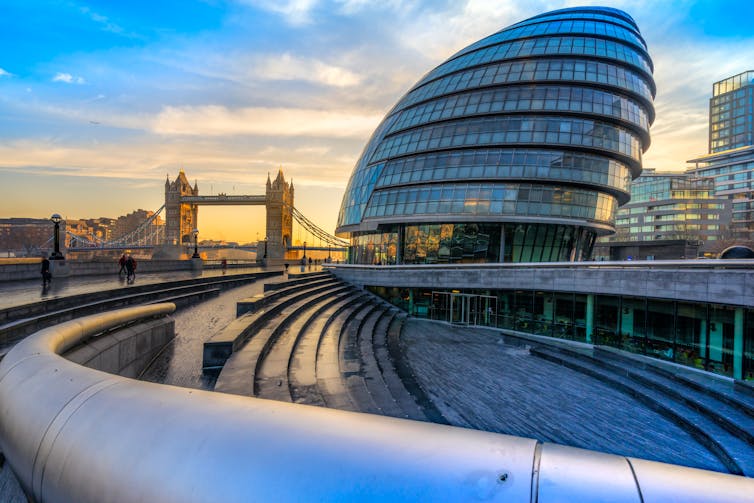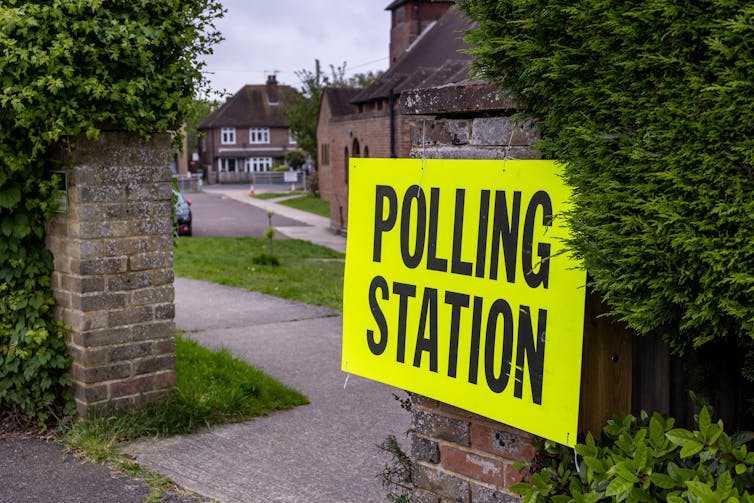One of the least spoken about shifts in English politics over the last decade is the move towards mayors. Starting with the establishment of the Mayor of London by Tony Blair in 2000, successive Conservative governments have created 11 mayoral combined authorities, each with its own directly elected mayor, since 2014.
These include most of England’s major cities, from Birmingham and Bristol to Liverpool, Leeds, Manchester, Nottingham and Newcastle. As a result, over 27 million people of England’s 55.98 million are now governed by a mayor – that’s nearly half of the nation’s population.
On those numbers alone, it seems likely that mayors will play some role in the upcoming general election. Mayors often enjoy a higher profile than local councillors, which means that how they fare at the polls is a good indication of what could transpire when the whole country heads to vote.
Want more general election coverage and analysis from The Conversation’s academic experts? Sign up for our new, weekly UK politics newsletter, delivered every Friday throughout the campaign and beyond.
In the most recent bout of local elections, in May 2024, Labour won all but one of the mayoral posts up for grabs. The Conservatives lost their most high-profile mayoralty in the West Midlands. The question is what these results herald for the forthcoming general election.
How the May 2024 local elections played out
When England went to the polls for the local elections in May 2024, ten of the 12 English mayoralties were in play. London’s Sadiq Kahn was seeking a third term. Greater Manchester’s Andy Burnham was one of several metro mayors attempting a similar feat.
Elswhere, voters were electing a mayor for the first time, in the East Midlands (which includes Nottingham), the North East (which absorbed the old North of Tyne combined authority) and York and West Yorkshire.
The results in some areas were a foregone conclusion. In Greater Manchester, Burnham won with 63% of the vote; in Liverpool city region, Steve Rotherham won with 68%. These are Labour heartlands, the very foundation of the now-infamous red wall.
In London, Khan handily saw off the challenge from Conservative Susan Hall. In doing so, he assuaged his party’s fears that high-profile opposition to the Ultra Low Emission Zone (Ulez) would be a vote loser.
The Ulez was largely seen as a defining factor in the 2023 Uxbridge by-election, the former seat of Boris Johnson. Khan’s win will therefore be of interest to both parties.
For Labour, it will show that emissions-reduction policies aren’t electoral suicide. However, for the Conservatives, who have since pivoted towards car-positive policies including banning the rollout of low-traffic neighbourhoods, it will just provide another headache: ideas and policies that they see as vote winners simply aren’t getting over with the broader public.
In the end, only Ben Houchen, who held on to his Tees Valley mayoralty, provided a glimmer of hope for the Conservatives. Indeed, it was this victory which was largely seen as staving off another challenge to Rishi Sunak’s leadership, allowing him to hold on to his position as prime minister.
A strong personal vote may have done enough for Houchen. It was not, however, sufficient to save the mayor of the West Midlands, Andy Street who lost by 1,508 votes (0.07%) to Labour’s Richard Parker.

What role mayors can play in the general election
On May 22 2024, less than three weeks after the local results were in, Sunak stood on the steps of Downing Street to call the general election. The mayors, though barely settled into their roles, are likely revisiting whatever plans they had for their first few weeks of office.
So far, the campaign has seen the Labour election machine spend its time away from the cities that form its core heartland. This is understandable. Labour is currently polling at 47%, 27 points ahead of the Conservatives. The party now needs to turn this lead into an electoral reality and the key battlegrounds on that front are not Liverpool, Manchester and Sheffield but rather places like Swindon, Nuneaton and Telford which have traditionally been change-makers in UK elections.
This is not true, however, of the sites of other recent mayoral victories including East and West Midlands and North Yorkshire, which are by no means guaranteed as safe wins for Labour. Here, it is likely that we will see the newly elected left-wing mayors putting in campaign appearances with senior Labour politicians to underscore their recent success.
It is here, too, that Sunak and the Conservatives will find themselves short of proven winners to populate campaign stops, and to create some momentum. Even Cabinet members might be in short supply for photo-ops given that YouGov’s latest MRP poll – which gives the best indication of what might happen in each individual constituency – suggests that many leading MPs including Chancellor Jeremy Hunt are at real risk of losing their seats. This might also go some way to explaining the recent glut of Conservative MPs, including Michael Gove, who have announced that they were standing down
That’s not to say that mayors including Burnham, Rotherham and Tracy Brabin in West Yorkshire won’t have a role to play in the coming weeks.

For one, Labour has already announced it will get rid of levelling up, a policy which has largely frozen out the metro mayors. What the party aims to replace it with is, as yet, unclear, but as the leaders of England’s major cities, these mayors will have something to say about it. Bruised from the cancellation of the second leg of High Speed 2, and a political culture which has largely overlooked the cities since the EU referendum, it is likely that they will argue for a renewed focus on their city-regions as major growth engines of the UK economy to help the country recover from the recent economic downturn.
It seems unlikely, however, that this general election will be won or lost in the UK’s cities. Many are already safe Labour seats, and are predicted to stay that way. However, the lessons from the mayoralties writ-large give us a good indicator of how the UK’s political sands have shifted in recent years.
For Labour, local elections have provided some reassurance the party is moving in the right direction. For the Conservatives, however, the real sense is that the mayoral wipeout is only a hint of what’s still to come.
Alex Nurse does not work for, consult, own shares in or receive funding from any company or organisation that would benefit from this article, and has disclosed no relevant affiliations beyond their academic appointment.
This article was originally published on The Conversation. Read the original article.







